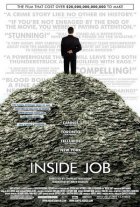
Inside Job Page #10
CHARLES FERGUSON: Why didn't you try looking?
01:
59:32.16FREDERIC MISHKIN: I think that people did. We had people looking at, a whole group
of people looking at this, for whatever reason –
Inside Job transcript – Sony Pictures – September 2010
45
CHARLES FERGUSON: Excuse me, you can't be serious. If you would have looked,
FREDERIC MISHKIN: Uh, you know, that's very, very easy to always say that you can
always find it.
01:
59:44.15NARRATOR:
As early as 2004, the FBI was already warning about an epidemic ofmortgage fraud. They reported inflated appraisals, doctored loan documentation, and
other fraudulent activity.
In 2005, the IMF's chief economist, Raghuram Rajan, warned that dangerous incentives
could lead to a crisis.
02:
00:06.19 Then came Nouriel Roubini's warnings in 2006; Allan Sloan's articles inFortune magazine and the Washington Post in 2007; and repeated warnings from the
IMF.
02:
00:18.02{DOMINIQUE STRAUSS-KAHN
MANAGING DIRECTOR
INTERNATIONAL MONETARY FUND (IMF)}
DOMINIQUE STRAUSS-KAHN: I said it, and on behalf of the institution: ah, the crisis
which is in front of us is a huge crisis –
CHARLES FERGUSON: Who did you talk to?
DOMINIQUE STRAUSS-KAHN: The government, Treasury, s-, Fed, everybody.
02:
00:27.21NARRATOR:
In May of 2007, hedge fund manager Bill Ackman circulated apresentation called "Who's Holding the Bag?", which described how the bubble would
unravel.
And in early 2008, Charles Morris published his book about the impending crisis.
02:
00:46.27FREDERIC MISHKIN: You're just not sure, what do you do? And you, you might have
some suspicions that underwriting standards are being weakened; but then the question
is, should you do anything about it?
Inside Job transcript – Sony Pictures – September 2010
46
NARRATOR:
By 2008, home foreclosures were skyrocketing, and the securitizationfood chain imploded. Lenders could no longer sell their loans to the investment banks;
and as the loans went bad, dozens of lenders failed.
02:
01:13.24GEORGE SOROS:
Chuck Prince, of Citibank, famously said that, uh, uh, we have todance until the music stops. Actually, the music had stopped already when he said that.
NARRATOR:
The market for CDOs collapsed, leaving the investment banks holdinghundreds of billions of dollars in loans, CDOs, and real estate they couldn't sell.
NOURIEL ROUBINI:
When the crisis started, uh, both the budha-, uh, Bushadministration and uh, and the Federal Reserve were totally behind the curve. They did
not understand the extent of it.
02:
01:47.27CHARLES FERGUSON: At what point do you remember thinking, for the first time, this
is dangerous, this is bad?
CHRISTINE LAGARDE: I remember very well, uh, one, uh, I think it was a G7 meeting,
of February 2008. And I remember discussing the issue with, with Hank Paulson. And I
clearly remember telling Hank: we are watching this tsunami coming. And you just –
proposing that we ask which swimming costume we are going to put on.
CHARLES FERGUSON: What was his response, what was his feeling?
CHRISTINE LAGARDE: Things are pretty much under control. Yes, we are looking at,
uh, this situation carefully, and uh – yeah, it's under control.
02:
02:30.11{G7 MEETING, TOKYO
FEBRUARY 9, 2008}
HENRY PAULSON:
We're gonna keep growing, okay? And obviously, I’ll, I'll say it: if, ifyou kee-, keep, if you're growing, you're not in recession, right? I mean, we, w-, we all
know that.
{THE RECESSION HAD ACTUALLY STARTED
FOUR MONTHS BEFORE PAULSON MADE THIS STATEMENT.}
02:
02:45.01Inside Job transcript – Sony Pictures – September 2010
47
{MARCH 16, 2008}
WOMAN REPORTER:
In a matter of days, one of the pillars of Wall Street sold to rival –NARRATOR:
In March of 2008, the investment bank Bear Stearns ran out of cash, andwas acquired for two dollars a share by JP Morgan Chase. The deal was backed by 30
billion dollars in emergency guarantees from the Federal Reserve.
{SIMON JOHNSON
PROFESSOR, MIT
FORMER CHIEF ECONOMIST
INTERNATIONAL MONETARY FUND}
SIMON JOHNSON:
That was the time when the administration could have come in, andput in place, you know, various kinds of measures that would have reduced system risk.
02:
03:11.05{JULY 10, 2008}
REP. PAUL KANJORSKI (D-PA): The information that I'm receiving from some entities
is the end is not here; that there are other shoes to fall.
HENRY PAULSON:
I, I, eh, well, I've seen those investment banks, uh, working withthe, uh, the, the Fed and the SEC to strengthen their liquidity, to strengthen their, uh,
the, the, the, their capital positions.
I get reports all the time. Our re-, our regulators are, are, are very vigilant.
02:
03:36.01NARRATOR:
On September 7th, 2008, Henry Paulson announced the federal takeoverof Fannie Mae and Freddie Mac, two giant mortgage lenders on the brink of collapse.
HENRY PAULSON:
Nothing about our actions today in any way reflects a changed viewof the housing correction or the strength of other U.S. financial institutions.
02:
03:56.02NARRATOR:
Two days later, Lehman Brothers announced record losses of 3.2 billiondollars, and its stock collapsed.
02:
04:03.26Inside Job transcript – Sony Pictures – September 2010
48
CHARLES FERGUSON: The effects of Lehman and AIG in September still came as a
surprise. I mean, this is even after July, and Fannie and Freddie. So clearly, there was
stuff that as of September — major stuff — that nobody knew about.
DAVID McCORMICK:
I think that's, I think that's fair.02:
04:23.22CHARLES FERGUSON: Bear Stearns was rated AAA, like, a month before it went
bankrupt?
JEROME FONS:
Uh, more likely A2.CHARLES FERGUSON: A2.
JEROME FONS:
Yeah.CHARLES FERGUSON: Okay.
JEROME FONS:
Yeah.CHARLES FERGUSON: A2 is still not bankrupt.
JEROME FONS:
No no no. No. That's, that's a high investment grade; solidinvestment-grade rating. Lehman Brothers; A2, within days of failing. Um, AIG, AA,
within days of being bailed out. Um, uh, Fannie Mae and Freddie Mac were AAA when
they were rescued. Um, Citigroup, Merrill; all, all of 'em had investment-grade ratings.
CHARLES FERGUSON: How can that be?
02:
04:55.06JEROME FONS:
Well, that's a good question. {LAUGHTER} That's a great question.CHARLES FERGUSON: At no point did the administration ever go to all the major
institutions, and say, you know: this is serious; tell us what your positions are; you know,
uh, no bullshit; where are you?
DAVID McCORMICK:
Um-hm.CHARLES FERGUSON: Um –
DAVID McCORMICK:
Well, first, that's what the regulators, that's their job, right? Theirjob is to understand the exposure across these different institutions, and they have a
very refined, uh, understanding that I think became more respon-, more refined as the
crisis, um, proceeded. So –
Translation
Translate and read this script in other languages:
Select another language:
- - Select -
- 简体中文 (Chinese - Simplified)
- 繁體中文 (Chinese - Traditional)
- Español (Spanish)
- Esperanto (Esperanto)
- 日本語 (Japanese)
- Português (Portuguese)
- Deutsch (German)
- العربية (Arabic)
- Français (French)
- Русский (Russian)
- ಕನ್ನಡ (Kannada)
- 한국어 (Korean)
- עברית (Hebrew)
- Gaeilge (Irish)
- Українська (Ukrainian)
- اردو (Urdu)
- Magyar (Hungarian)
- मानक हिन्दी (Hindi)
- Indonesia (Indonesian)
- Italiano (Italian)
- தமிழ் (Tamil)
- Türkçe (Turkish)
- తెలుగు (Telugu)
- ภาษาไทย (Thai)
- Tiếng Việt (Vietnamese)
- Čeština (Czech)
- Polski (Polish)
- Bahasa Indonesia (Indonesian)
- Românește (Romanian)
- Nederlands (Dutch)
- Ελληνικά (Greek)
- Latinum (Latin)
- Svenska (Swedish)
- Dansk (Danish)
- Suomi (Finnish)
- فارسی (Persian)
- ייִדיש (Yiddish)
- հայերեն (Armenian)
- Norsk (Norwegian)
- English (English)
Citation
Use the citation below to add this screenplay to your bibliography:
Style:MLAChicagoAPA
"Inside Job" Scripts.com. STANDS4 LLC, 2025. Web. 23 Feb. 2025. <https://www.scripts.com/script/inside_job_42>.







Discuss this script with the community:
Report Comment
We're doing our best to make sure our content is useful, accurate and safe.
If by any chance you spot an inappropriate comment while navigating through our website please use this form to let us know, and we'll take care of it shortly.
Attachment
You need to be logged in to favorite.
Log In